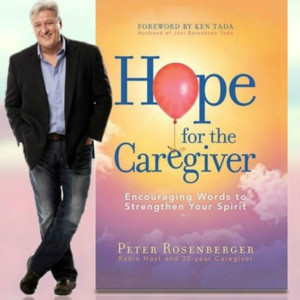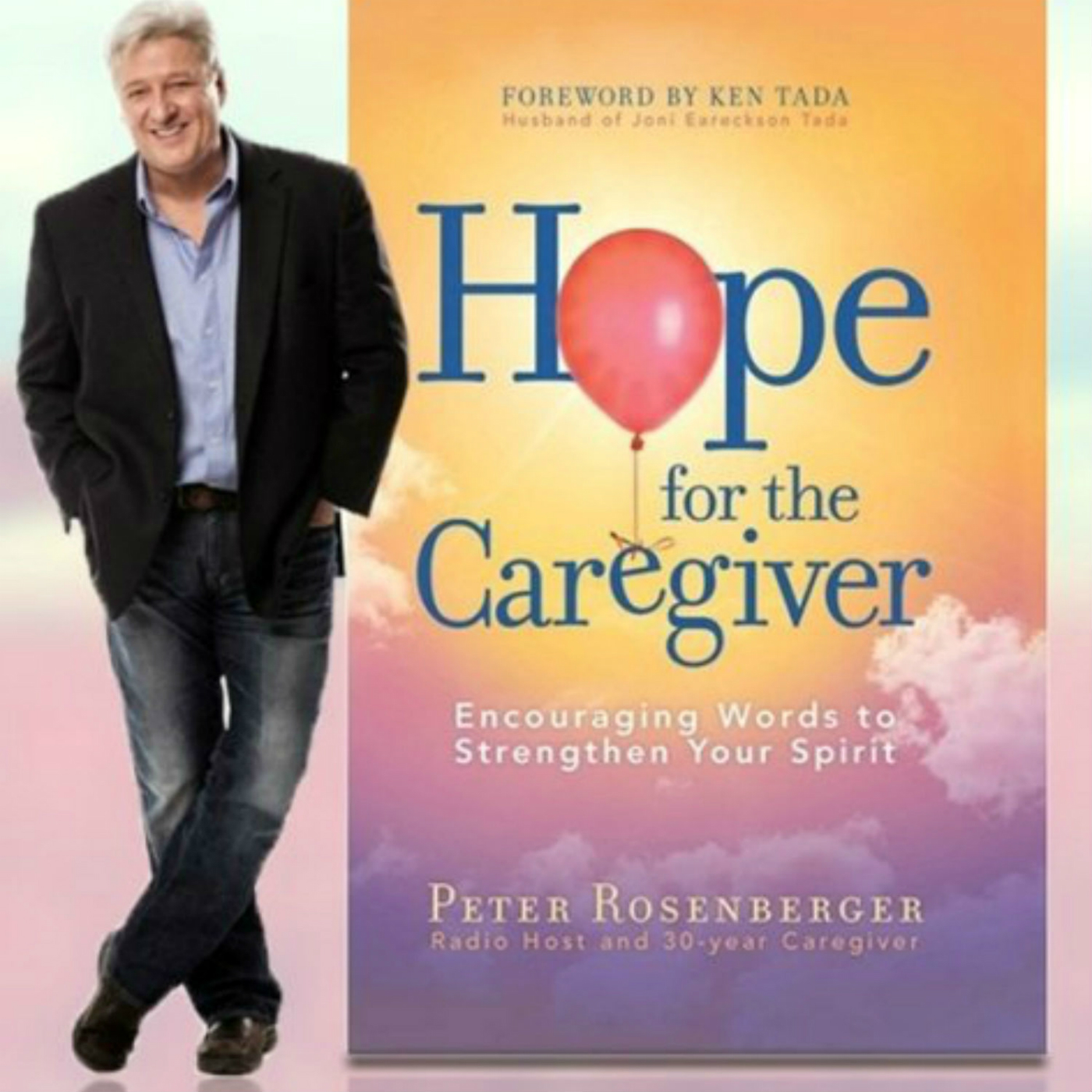Episodes

Thursday Dec 09, 2021
Compassion For Caregivers at Christmas
Thursday Dec 09, 2021
Thursday Dec 09, 2021
My interview on Family Life Radio discussing ways to help caregivers at Christmas.
There's more at HopeForTheCaregiver.com

Sunday Dec 05, 2021
What Caregivers Can Learn From Hanukkah
Sunday Dec 05, 2021
Sunday Dec 05, 2021
Rabbi Eric Walker called the program to discuss Hanukkah - and what caregivers can learn from the "Festival of Lights."
Learn more about Eric Walker at www.ignitinganation.com

Friday Dec 03, 2021
Assure Rather Than Argue
Friday Dec 03, 2021
Friday Dec 03, 2021
Do you ever listen to talk radio or cable news when the panel starts to argue? The voices become an unsettling “wall of noise,” and most change the channel in seconds. If we’re annoyed by talking heads shouting over politics, imagine the unsettledness of those with cognitive issues engaging in or listening to arguments.
When dealing with someone with an impairment, all kinds of subjects fly into the conversation. From seeing things not there to recalling things inaccurately, it remains pointless to argue when cognitive decline is present. Despite even brilliant oratory, the impairment still wins the battle. Rather than pointlessly escalate blood pressure, tensions quickly diffuse when assuring instead of arguing.
Being right is a poor substitute for being there. Like all of us, people with cognitive issues find themselves unsettled, but they often cannot process those circumstances or problems. The human condition eventually leads us into places of fear and confusion where we all desperately need assurance – regardless of our abilities or inabilities. Ironically, we often discover more assurance for ourselves by offering it to others in distress.
“Peace is not absence of conflict, it is the ability to handle conflict by peaceful means.”
- Ronald Reagan
Please feel free to share this podcast with others and help us do more at www.hopeforthecaregiver.com/giving

Wednesday Dec 01, 2021
Don‘t Stress About Christmas Shopping - Try This Instead
Wednesday Dec 01, 2021
Wednesday Dec 01, 2021
As a caregiver, do you like shopping? Do you enjoy traffic, crowds, lines, etc?
Here's a suggestion that I worked out for fellow caregivers.
Get all your shopping done at MyPillow.com and use the promo code: caregiver
You'll get a special discount on EVERYTHING on the site!

Wednesday Nov 24, 2021
There Used To Be M & M‘s
Wednesday Nov 24, 2021
Wednesday Nov 24, 2021
For as long as I can remember, when my father arrived home from reserve duty in the military, he brought each of my brothers and my sister a pack of M & M’s. Extending past his service as a naval officer, he and my mother continued the tradition when we returned from college. Each time we showed up with our luggage (sometimes filled with dirty laundry), we’d walk into our rooms to find a bag of M&M’s waiting on the pillow.
When they moved from the house where they raised five sons and a daughter, their new home carried the custom. Bringing our spouses, then children, and now even our grandchildren, the familiar brown-bagged treats (sometimes the yellow bags of peanut M&M’s) from my parents awaited every family member.
Except for this year.
Nearly succumbing to congestive heart failure, my mother endured a dramatic and challenging year—as did my father. A US Naval officer and pastor for almost 60 years, my father stepped into the role of caregiver for the first time, and I watched the process take a toll on him.
It felt odd. While I’ve cared for my wife with severe disabilities for more than 35 years, I’ve never seen my dad in this role. I found myself placing a hand on his shoulder, much like he did for me many times following my wife’s now eighty-plus operations. He sat with me in countless ICUs, hospital rooms, and waiting rooms. Now I sat with him.
His seasoned faith remains intact and strong, yet he struggled to wrap his mind around the relentless assault of continued medical setbacks. With the same gentleness and encouragement he offered to me over decades of caregiving, I returned the favor.
I’ve often heard that “…There’s no pain like watching your children hurt.”
Watching your parents hurt must run a close second.
With a herculean effort by medical staff, along with my mother’s grit, she pulled through. While not where she’d like to be, she’s further than most expected. After a couple of months away, we returned to their home for the Thanksgiving holidays. They look tired, older, but optimistic. The family pulled together, and the house looks great. The only significant difference I noticed was an oxygen tank in their bedroom.
For the first time in my memory, however, no M & M’s waited on the pillows. The absence of those treats indicates a passage and a farewell to parts of who they used to be. Their home stands in a heavily wooded area of upstate South Carolina. As we prepare for Thanksgiving, the trees surrounding their home continue shedding an entire color palate of leaves. The loveliness of autumn is a sad one that brushes hearts the same way the wind grazes branches.
So it is when watching those who loomed large in our lives diminish in vigor, but not in beauty. As many will attest, it’s the shedding of small things—the wisps of everyday things taken for granted—that often bring a tear.
During holidays, deep feelings seem to rise to the surface faster than other times. For many Americans, Thanksgiving marks the beginning of a difficult season of slow goodbyes, bittersweet celebrations, and, for some, the ache of absence.
Yet, not all is sorrow. Slowing our lifestyles to the pace of our hearts, we can cling to each other a bit tighter. After dinner, we can pause a little longer at the table—or sit quietly for an extra couple of minutes with those we love. If a chair is empty, we can choose to fill that seat with cherished memories.
Families across our country feel this kind of heartache— one so deeply connected to caregiving. Helping those caregivers is no easy task. Yet, that help remains critical to not only the caregiver but also their loved one. Part of that help is assisting caregivers in grieving without them sinking into despair. Doing so always involves redirecting our gaze to gratitude.
The treats I’ve enjoyed for a lifetime no longer await me, but the loving hands that placed them are still here to hold. Placing that candy on their pillows instead, I now possess a greater understanding of the joy they both shared—for a lifetime.
This Thanksgiving, I discovered gratitude can be found in something as simple as a bag of M & M’s.
Grief is the price we pay for love. Queen Elizabeth II

Monday Nov 15, 2021
We Will Cast These Down
Monday Nov 15, 2021
Monday Nov 15, 2021
From our nationally syndicated broadcast 11-13-2021

Thursday Nov 11, 2021
Patriots Standing In the Gap
Thursday Nov 11, 2021
Thursday Nov 11, 2021
A recent caller to my radios program shared her journey as a caregiver. Combat-related PTSD led her military son down some dark paths—including drugs and alcohol, and his family disintegrated. This grandmother found herself with an impaired son and vulnerable grandchildren. When considering the word “caregiver,” most think of caring for the elderly. Yet many kinds of caregivers exist—and each of them bears their own sadness and difficulties. It is often stated that soldiers leave a part of themselves on the battlefield. Sometimes, caregivers work to compensate for those missing pieces as they care for the seen and unseen wounds of injured servicemen and women. While our military is composed of those who volunteer to don the uniform, an additional and less visible army of volunteers exists. Those volunteers are family caregivers who stand in the gap for wounded warriors—and often their families. Their acts of devotion not only serve their loved ones but also honor this great nation.
There is much more to being a patriot and citizen than reciting the pledge or raising a flag. – Jesse Ventura

